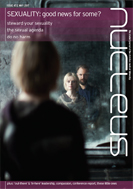Black boys are blue in the moonlight. A fitting tagline for a movie about self-discovery and individuality. A movie written by black people for a black audience, with an Oscar for Best Film. It is easy to see why Moonlight became such an important film for young black people. It begs the question -how do we define ourselves?
Chiron starts the film as a young boy who is immediately 'othered' by his peers and adults. His search for himself starts before he is even aware that it is a necessary journey. We watch him grapple with his sexuality and how this has become his identity. Before he understands sexuality, society had given him a label, not just a part of him but who he is. As he begins to understand why he is different,he realises he must decide if he will continue to be different. 'At some point you gotta decide for yourself who you gonna be',says his father Juan, heralding the beginning of Chiron's search for himself. From this point, Chiron is confronted by difficulties in his home life and with peers. But with nowhere to seek solace, he finally proves he is tough enough when he lashes out at a bully and is arrested.
This film provides a compelling commentary on the African-American coming of age experience, with no singular battle or struggle. It is beautifully shot, with the focus on the experiences of a young man from a single-mother household. And whilst throughout the film we are rooting for Chiron, cheering as he stands up to bullies and smiling as he comes into his own, I wonder how the story may have differed if Christ were introduced. If Chiron's identity were not something he had to mould and create for himself, if Chiron understood he was accepted and loved - how could his path have been different?
In a society that says we are able to discover and define ourselves completely without a reference point can there bean objective truth? When we are able to recreate ourselves without a guide, is right and wrong only relative? Or is there safety, security and acceptance in communion with the Father who offers an objective truth?
As the film comes to an end Chiron is asked,in an echo to Juan's advice earlier in the film,'who is you?' This is clearly what the film has been building to, so we are pleased when Chiron answers, 'I am me, I ain't trynna be nothing else'. I suppose at this point, the salient question is:who are we?
Nandi Mnyama is a medical student at HYMS and a CMF Deep:ER volunteer
Chiron starts the film as a young boy who is immediately 'othered' by his peers and adults. His search for himself starts before he is even aware that it is a necessary journey. We watch him grapple with his sexuality and how this has become his identity. Before he understands sexuality, society had given him a label, not just a part of him but who he is. As he begins to understand why he is different,he realises he must decide if he will continue to be different. 'At some point you gotta decide for yourself who you gonna be',says his father Juan, heralding the beginning of Chiron's search for himself. From this point, Chiron is confronted by difficulties in his home life and with peers. But with nowhere to seek solace, he finally proves he is tough enough when he lashes out at a bully and is arrested.
This film provides a compelling commentary on the African-American coming of age experience, with no singular battle or struggle. It is beautifully shot, with the focus on the experiences of a young man from a single-mother household. And whilst throughout the film we are rooting for Chiron, cheering as he stands up to bullies and smiling as he comes into his own, I wonder how the story may have differed if Christ were introduced. If Chiron's identity were not something he had to mould and create for himself, if Chiron understood he was accepted and loved - how could his path have been different?
In a society that says we are able to discover and define ourselves completely without a reference point can there bean objective truth? When we are able to recreate ourselves without a guide, is right and wrong only relative? Or is there safety, security and acceptance in communion with the Father who offers an objective truth?
As the film comes to an end Chiron is asked,in an echo to Juan's advice earlier in the film,'who is you?' This is clearly what the film has been building to, so we are pleased when Chiron answers, 'I am me, I ain't trynna be nothing else'. I suppose at this point, the salient question is:who are we?
Questions for Moonlight
- How does Chiron's identity evolve in the film?
- How important is his sexuality to his identity?
- What is Moonlight telling us about ourselves ethically?
- How do you define yourself? How has that changed in your life?
- What does the Bible say about our identity? How much is it God-given or self-created?
Nandi Mnyama is a medical student at HYMS and a CMF Deep:ER volunteer































